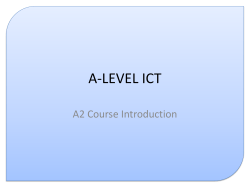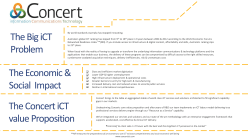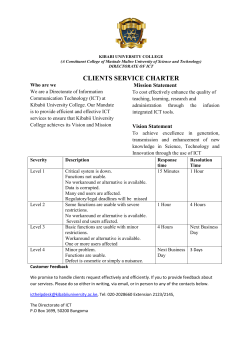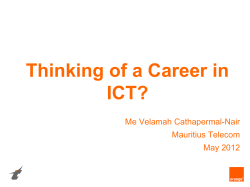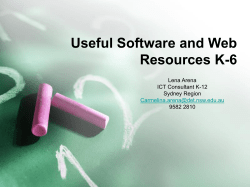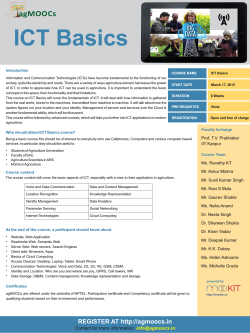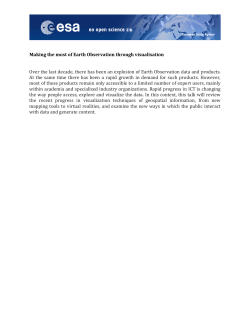
PROBLEMS AND PROSPECTS OF INFORMATION
UGC Sponsored National Seminar On PROBLEMS AND PROSPECTS OF INFORMATION AND COMMUNICATION TECHNOLOGY ON THE DEVELOPMENT OF HIGHER EDUCATION IN ASSAM Organised By Deptt. of Sociology & Philosophy HARHI COLLEGE, DHAKUAKHANA In Collaboration with Brahmaputra Degree College, Dhakuakhana 24th July, 2015 Venue: Harhi College Auditorium P.O.- Gobindapur, Dhakuakhana Dist.- Lakhimpur, Assam, PIN-787055 Website- www.harhicollege.org E-mail- harhicollege1996@gmail.com INVITATION Sir/Madam It gives us immense pleasure to inform you that the Departments of Sociology and Philosophy, Harhi College, Dhakuakhana is going to organize a UGC Sponsored National Seminar on “Problems and Prospects of Information and Communication Technology on the development of Higher Education in Assam ” to be held on the 24th July, 2015. So, we would like to invite you to participate and contribute research paper. Your presence and participation will make the occasion more meaningful and successful. With sincere regards, Deep Dutta Dr. Manash Jyoti Neog Thagendra Chutia Principal cum Chairman Coordinators Ananda Bharali Vice-Principal Cum Vice-Chairman Seminar Organizing Committee Harhi College, Dhakuakhana ABOUT THE THEME Now a day’s information and communication technology (ICT) plays a vital role in every aspects of human life whether they may be residing in developed countries or not. For more than forty years, innovative educators have been optimistic about information and communication technology uses in educational institutions. The rapid fall in the price of hardware, the easy accessibility of hardware, the exponential increase in computer power, and easy accessibility of the Internet, which has opened a host of new possibilities conceived within the last decade. To date, many initiatives in ICT for education in developing countries including India have been initiated to increasing information access for educational institutions in general and specifically for teacher training, aimed at using ICTbased resources and tools in the classroom. Evidence that the use of ICT leads to higher student achievement or other positive effects is limited to pilots that have yet to be implemented on a larger scale in developing countries. The flexibility and accessibility enabled by ICT have led to the emergence of open distance learning, wherein the teacher is removed in space and time from the students and most communication is through an electronic media such as, internet, radio, television etc. Distance education has taken the form of open universities that have adopted a student-centered approach in higher education systems in a number of countries. Open universities have been established to meet the increasing demand for higher and/or tertiary education while providing opportunities to working adults and others who face constraints in accessing such education in its traditional form. It is said that the role of information and communication technology in education is vital. Here raises some fundamental issues and questions whether ICT is suited to transmitting knowledge, particularly to students who are not already highly motivated to learn or well versed in the art of using and interpreting information. In the reference the world of business it is showed that ICT has been played an important role in it. In present days, the main application of ICT in the business sector has focused on aiding access and processing of large quantities of information for employees and management with the principal aim of increasing productivity. In the case of education, what may be the grounds for which education is not yet been fully influenced by ICT and why? It is remarkable that in the university level, ICT has already made an important impact, whether in terms of teaching, research or administration etc. At present, India could attained in such a position that she could compared among the highly developed countries of the world in the field of ICT. Being a separate state of the country, the state Assam has also been influenced by the fact and created an environment in the field ICT and its’ application on various aspects of the social life including the field of education. However, ICT has the potential to “bridge the knowledge gap” in terms of improving quality of education, increasing the quantity of quality educational opportunities, making knowledge building possible through borderless and boundless accessibility to resources and people, and reaching populations in remote areas to satisfy their basic right to education in this state. Due to the fact, the State govt. has given priority in the field of extension of ICT in education by providing ICT instruments to various institutions as well as to some specified students too. So, an attempt is made through this Seminar to examine how ICT plays its significant role in the development of higher education in such a backward state like Assam, its effectiveness and find out the obstacles. Sub themes: (a) (b) (c) (d) (e) Problems regarding the implication of ICT in rural oriented colleges. ICT literacy and skill development. A comparative study on ICT oriented education and the traditional education. ICT could able to fulfill the need of the rare knowledge’s. ICT meets the increasing demand of the open and distance learnings. (f) (g) ICT and its impact on research works. Negative impacts of ICT on teenage students, etc. Call for Papers Research papers are invited in the form of original works from the researchers, academicians, teachers from universities and colleges, research scholars, social workers and students. Two hard copies and one soft copy (CD) of full paper are to be submitted. Medium of research paper The medium of research paper can be either Assamese or English. Assamese Font: Geetanjali (RAMDHENU). In case of the English the researcher should type the research paper in MS-Word in Times New Roman with font size 12. Guidelines Authors are requested to follow strictly the specifications given below without which it will be difficult for selection of papers for publication. The guidelines for submission of abstracts and full papers are as follows. Submission of abstract Abstract of the research paper should be submitted with the following information and in this order: a) title of abstract, b) name of author(s), c) institutional affiliation, d) email address, e) telephone numbers, f) body of abstract and g) key words (alphabetically). The abstract should not exceed 250 words. Submission of full paper 1. Title of the Paper 2. Name of the Author/Authors 3. Designation and Institution 4. Email Id 5. Copy of the Abstract Submitted 6. Main Body of the Paper 7. Bibliographical references should be arranged alphabetically and given at the end of the text in the APA* format. 8. Do not use foot notes, use only end notes before the references (if any). 9. Word Limit- 3000 words *APA Style: Surname, name, year of publication, title of the book, place of publication ExampleRogers, C. R. (1961). On becoming a person. Boston: Houghton Mifflin. In case of edited book Adler, A. (1956). The individual psychology of Alfred Adler: A systematic presentation of selections from his writings. (H. L. Ansbacher & R. R. Ansbacher, Eds.). New York N.B. Authors are requested to kindly send the ABSTRACT and FULL PAPER through E-mail to the ID: thagendrachutia@gmail.com Publication Selected papers will be published as a book volume having ISBN and will be distributed to the participants on payment basis. Important Dates a) Last date of submission of Abstract: 10th July, 2015 b) Last date of submission of Full Paper: 15th July, 2015 Registration Fees a) Participant with paper : 500/b) Participant without paper: Rs. 200/Accommodation The organizing committee will provide accommodation to outstation participants on payment and this correspondence must be made ten days before the seminar. Travel and Connectivity 1) The college is located 5km north of Dhakuakhana town. 2) Regular day and night bus services to and from Dhakuakana and Guwahati as well as other parts of the state. 3) Ferry connection is available from Disang Ghat (Sivsagar) to Matmora Ghat (Dhakuakhana). 4) Local vehicles are also available from Dhakuakhana town to the college. ABOUT THE COLLEGE Harhi College was set up in 1996(Academic Session 1998-99) and situated at a very beautiful landscape on the bank of the river Charikoria of the rural SubDivision of Dhakuakhana, P.O.-Gobindapur, Dist- Lakhimpur, Assam. It is only a premier institution of Higher Education, covering almost 5 GP where most of the people basically belong to ST, SC, OBC and MOBC. The college now tills the date of establishment, imparting higher education and providing Knowledge and skill in Arts among the poor students. The College which began with a few students in HS and BA 1st year classes and the faculty was consisted of only five members, is now a full-grown one in the rural Sub-Division of Dhakuakhana. The faculty now increases up to 34 and most of them have M. Phil degree. Some are now getting admittance in Ph. D course. The college has a student enrolment of more than 1200 right from HS to the BA classes in conventional mode. Besides, the college has another 200 students in Open School under Assam Higher Secondary Council, BA Part-1 and MA classes under Directorate of Distance Education, DU, in nonconventional mode. The college campus extends over an area of more than 48 Bighas of land of which 8 Bighas of low land are still covered under Fishery and another 7 Bighas of land are under the coverage of Chum plantation. Besides, the campus of the college is nicely built including Employees’ Residential Quarters. The College has already been received final concurrence from the State Govt. of Assam on 22-12-2005, Affiliation from Dibrugarh University on 05-102005, 2(f) registration from UGC on 18-09-2008 and received UGC 12(B) recognition on 21-01-2011. After receiving the recognition under the section 12(B) from UGC, now the college is able to receive a huge amount of grant from UGC to construct Women Hostel, Indoor Stadium, Outdoor Stadium and to uplift the library facility. The college has Provincialised by the Assam Venture Educational Institutions (Provincialisation of Services) Act, 2011 and Amendment Act, 2012 in the year 2013. UGC Sponsored National Seminar On Problems and Prospects of Information and Communication Technology on the development of Higher Education in Assam Organized By Deptt. of Sociology & Philosophy Harhi College, Dhakuakhana, Lakhimpur 24th July, 2015 Registration Form Name (Capital Latter)……………………………………………….…………… Designation……………………………………………………………………… Institution…………………………………………………………………………… Phone Number…………………………………………………………………………… Registration fees paid…………………………………….………………………. Address: …………………………………………………………………………… Telephone………………………………………………………………………… E-mail……………………………………………………………………………… Title of the paper………………………………………………………………….. ……………………………………………………………………………………… …………… Requirement of Accommodation (Please Tick): Date… Yes ( ) No ( ) Signature of the participant Address for communication Dr. Manash Jyoti Neog Principal, Harhi College Contact No. 9435277478 Email Id- harhicollege1996@gmail.com Deep Dutta Assistant Professor, Department Of Sociology Harhi College, Gobindapur Contact No. 8011246414, deepduttadhk@gmail.com Thagendra Chutia Assistant Professor, Department Of Philosophy Harhi College, Gobindapur Contact No. 9401665360, 9678666788 Email Id- thagendrachutia@gmail.com
© Copyright 2025

